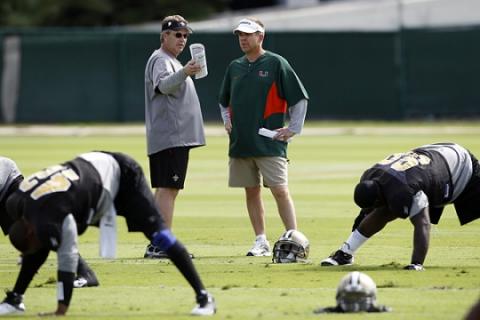NFL Bounty Scandal: The Sins of the Saints
TIME IDEAS
March 6, 2012
by Doug Glanville
Why would a player making millions succumb to a bounty scheme that earns him peanuts?
He just wants to be a part of the team. We know how peer pressure can poison a high-schoolers social life. Rash decisions, keeping up with the Jones, being cool for that crush. But it doesn’t stop in high school and, as a recent scandal with the New Orleans Saints shows, it also permeates professional sports.
The Saints recent defensive coordinator, Gregg Williams, ran (and head coach Sean Payton knew about and failed to stop) a bounty hunting program that encouraged players to injure their opponent. According to the league, the money was pooled by 22 of 27 defensive players and distributed by paying $1500 for “knockouts” and $1000 for “cart-offs” on targeted players (Before the 2009 NFL Championship game, Saints linebacker Jonathan Vilma allegedly offered $10,000 to any teammate who could knockout Brett Favre.) Decapitation probably wasn’t on the official list, but it might as well have been.
As a former professional athlete, I understand the need to show that you will not be intimidated. In baseball, ownership and command over the strike zone is the battle between pitcher and hitter. Hitters need to establish that they have no fear in that batter’s box and pitchers must show no fear in buzzing a ball by your head if necessary to back you off of the plate.
Of course in football, players are not just worried about what the ball can do to you. They are dealing with human torpedoes coming at them from all directions, even from their blind spots. Life in those kinds of trenches makes it very easy for players to go too far and start using tactics that eliminate their opponent, instead of just beating them.
Bounty hunting is against the rules of the leagues precisely because this has happened before and nothing good has come out of it. The Chicago Bears were both executors and victims of the system. At one point, Green Bay Packer, Charles Martin, body slammed Bears quarterback, Jim McMahon, so late after the whistle that he might as well had done it in the parking lot after the game.
Notorious football hit man Ndamukong Suh of the Detroit Lions has been under the microscope for his aggressive play. When asked about bounties, Suh responded, “I don’t take part in those things and nor do my teammates and nor my coaches. We don’t allow that. For me, personally, and I know my teammates, we don’t want to put anybody out. Especially me, I would never want anybody to target me to take me out, so why would I do it against somebody else?”
At $1000-1500 an injury, players who have million-dollar contracts who participate in bounties are clearly not doing it for the money. They’re doing it for acceptance, for camaraderie, and most of all because their teammates are doing it. In any locker room culture, if you don’t participate in what your teammates are advocating, you may be considered traitorous. (The vast majority of the Saints paid into the kitty—what did they think of the five players who did not join in?) And there’s not much difference between a normal gametime hard hit that injures someone and a hard hit that was premeditated from some sort of twisted mailing list, especially to a professionals who can disguise hits in many ways. The common denominator is the perception of what needs to be done to promote unity which underlies an unchecked and long-standing reckless culture, one in which participants are unable to turn back even if they wanted to because they imagine that the punishment for locker room treason under such a system is much worse than the crime.
Republished from TIME Ideas






